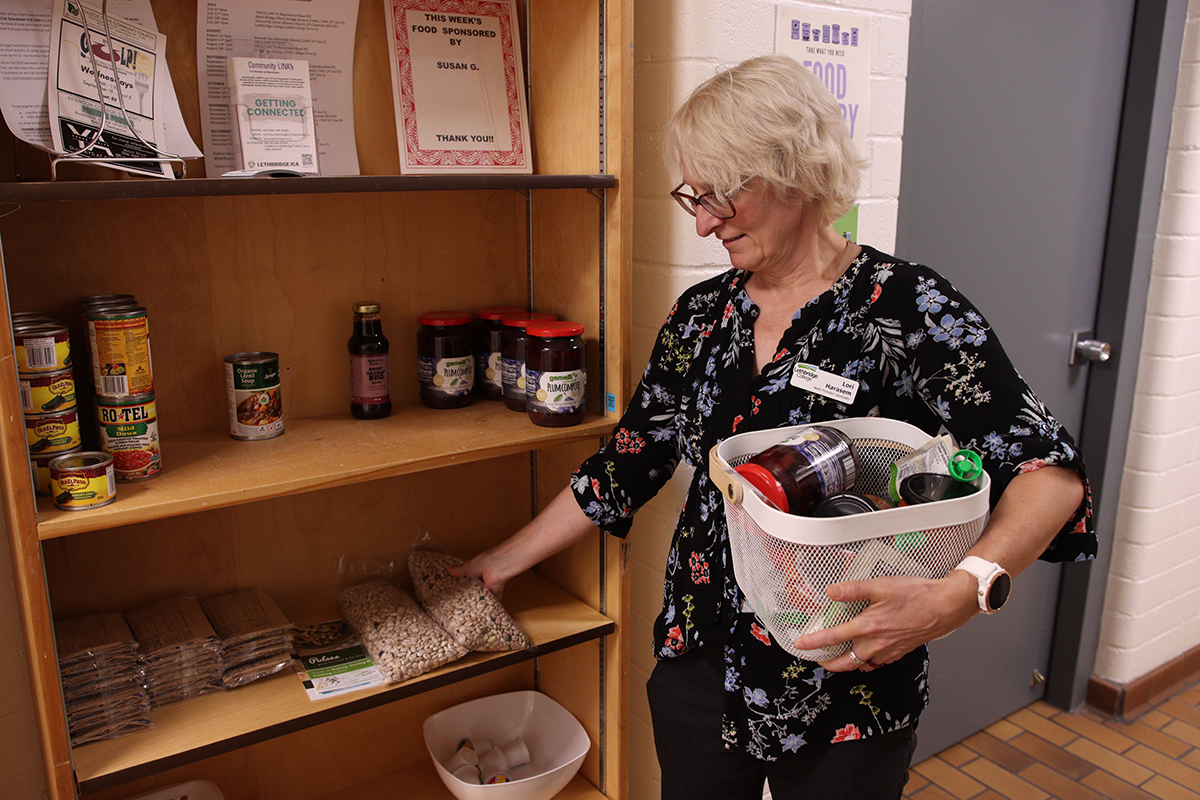Lori Harasem, health promotions coordinator, stocks the shelves of the food pantry at Lethbridge College on Oct. 11. Photo by Zach Robinson
In an effort to support struggling students experiencing food insecurity, Lethbridge College has taken action by making food more readily available to those in need.
One expert says food security is a challenge faced by many students, but some may find requesting aid to be a difficult task. Lethbridge College Wellness Services, in collaboration with the Lethbridge College Students’ Association and the Ecumenical Campus Ministry, has installed a food pantry for students to freely take what they need. Understanding the difficulties students face, Lori Harasem, health promotions coordinator, says concerns about food security have been growing. She hopes the pantry will help combat those issues.
“We’ve seen statistics from the LCSA food bank that show the need for more food security initiatives have been increasing over the last couple of years. So, we decided it was time to try to add something just to make sure that all students were able to, as much as possible, access at least some food.”
There are more options available at the post-secondary institution, such as the LCSA food bank, but the stigma surrounding these support services prevent many from seeking help. According to the Interfaith Food Bank, one in five Albertans are food insecure. Multiple factors can play into why someone wouldn’t reach out for assistance, such as wanting to support themselves, too embarrassed to ask for help and worries about people they know finding out.
The area where the pantry is located was carefully chosen, near Harasem’s and the LCSA’s office, so they could keep the food pantry stocked at all times as well as to maintain discretion. Angela Fretts-Waters, association services coordinator, says these factors were taken into consideration as a way to address the stigma.
“For some students, there’s still a stigma about using a food bank. So, with the food pantries, we’re hoping that it will reach those students.”
If students are struggling and may need help beyond the pantry, Fretts-Waters urges people to reach out to the LCSA to sign up to the food bank. They make the process of receiving assistance as quick and easy as possible, as well as discreet as possible.
This first food pantry is a pilot project for the fall semester and there are plans to install more at various locations around campus to reach those in need. Harasem says if anyone wishes to contribute, then they are free to leave non-perishable food items on the shelves of the pantry.
“Our biggest priority is finding the funding and donations to sustain it. And that will be if we can do that really well this semester, we’ll add pantries and see if we can sustain more pantries around campus.”
Food insecurity can also lead to a decline in a person’s mental health. According to Cambridge University Press in an article on Food insecurity and mental health: a systematic review and meta-analysis published on March 16, 2020, there is reason to believe that food insecurity can increase stress, anxiety and depression, which can impact one’s studies. The same article suggests that support services aimed at reducing the insecurity also alleviate those symptoms.



